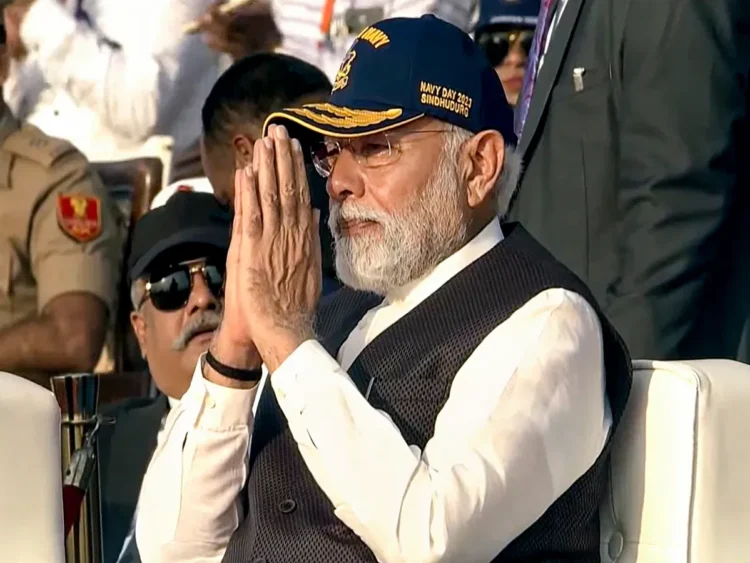On the glorious occasion of India’s Navy Day, celebrated on December 4, 2023, Indian Prime Minister Narendra Modi at the Sindhudurg Fort said to the naval authorities that from now on, the personnel of the maritime force will be wearing new epaulettes bearing the imprint of the legendary Maratha warrior king Chhatrapati Shivaji Maharaj.
Efforts For Indianisation
The new epaulettes and the Indianised ranks will be the latest in a series of changes introduced by the Indian Navy last year to discard the British colonial legacy and empire. The navy will be adopting a new ensign, doing away with batons for commanders and allowing traditional Indian wear in officers’ mess.
The navy has completed a review of ranks held by the sailors inherited from the British and is set to replace them with Indianised designations as part of a larger drive to jettison colonial military traditions. The gender-neutral changes to the ranks will be announced shortly. More than 65000 sailors will get new ranks.
The ranks that will be made to align with the Indian traditions are Master Chief Petty Officer 1st Class, Master Petty Officer 2nd Class, Chief Petty Officer, Petty Officer, Leading Seaman, Seaman 1st Class and Seaman 2nd Class.
PM Modi Address
“Inspired by the ideals of Chhatrapati Shivaji Maharaj, today’s India is moving forward and abandoning the mentality of slavery. I am happy to announce that the epaulettes donned by naval personnel will now highlight the heritage and legacy of Chhatrapati Shivaji Maharaj and will be similar to the naval ensign,” he said.
With the feeling of taking pride in one’s heritage, I am proud to make another announcement. The navy is now going to rename its ranks in line with Indian tradition, he said.
The PM recalled unveiling the naval ensign last year while commissioning India ‘s first indigenous aircraft carrier, INS Vikrant. The flag, which featured the St George Cross earlier, has not been replaced by Chhatrapati Shivaji Maharaj’s ensign.
In his 23-minute speech, PM Modi touched upon India’s maritime and rich naval heritage, especially how Shivaji Maharaj shaped the naval power, the rejection of the politics of negativity by the people in the context of election results, the country’s rise as an economic powerhouse, self-reliant achievements, and India’s march to become a developed nation.
Victory in Elections
PM Modi also said that the trust of 140 crore Indians is the country’s biggest strength as it was setting goals and working to achieve them with full determination. This strength is the power of the world’s biggest democracy, he said. “You saw the reflection of this strength in four states yesterday A glimpse of positive outcomes of unity of resolutions, emotions and aspirations is visible as people of the diverse states are being driven by the spirit of ‘nation first.’
Today, the country has taken inspiration from history and is busy preparing a roadmap for a bright future. People have pledged to move forward in every field by defeating the politics of negativity. This pledge will take us towards a developed India.”
Women Officers in the Indian Navy
The PM, who witnessed an operational demonstration by the warships, submarines and aircraft and the elite MARCOS (Marine Commandoes) from Sindhudurg’s Tarkarli beach, emphasised the government ‘s resolve to strengthen Nari Shakti in the armed forces while congratulating the Indian Navy on a landmark appointment of a lady officer commanding a warship.
Lieutenant Commander Prerna Deosthalee is set to assume the command of the INS Trinket, the development coming three decades after the Navy began to induct women as officers along with two other services.
On Indian Heritage
He said India’s history was not just about slavery, defeats and disappointments, but it also held glorious chapters of history, courage, victories, knowledge, science, art, and creative skills on maritime capabilities. Noting that the country’s maritime power first came under attack by foreign powers, PM Modi said that India, which was famous for making ships and boats, lost control of the sea and a key strategic economic strength.
He said India was now regaining its lost glory and highlighted the government’s efforts to boost the blue economy. “This is that period of India’s history, which is going to write the future not just of five to 10 years but for the coming centuries.” He said measures like the India-Middle East-Europe economic corridor will recreate the lost Spice route.



















Comments